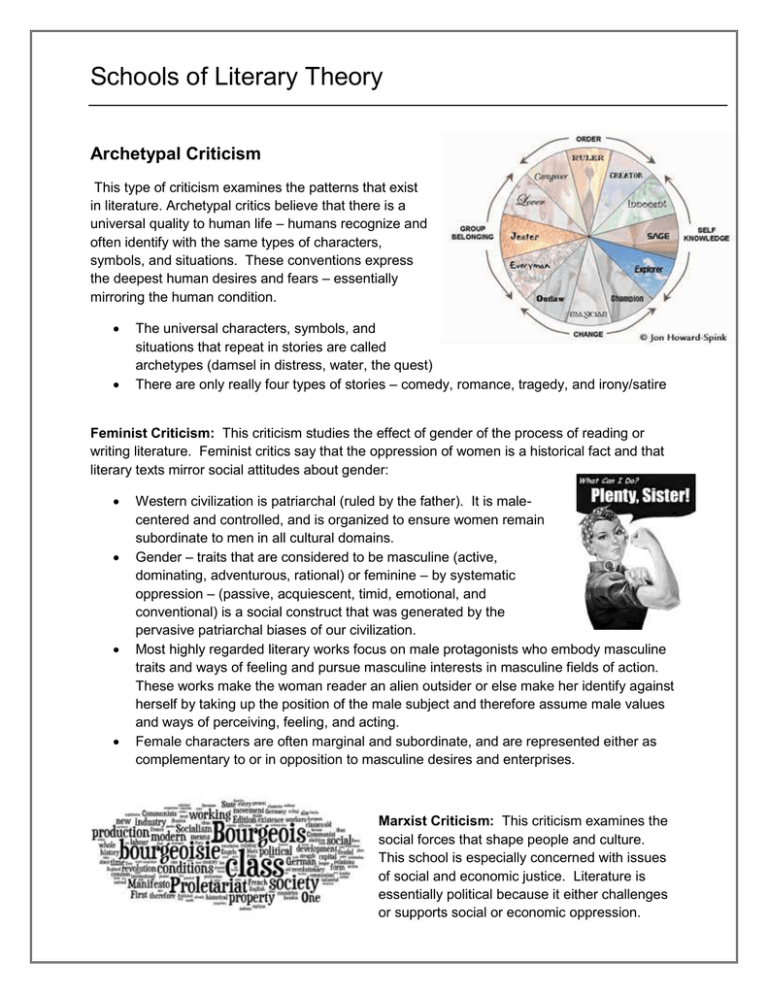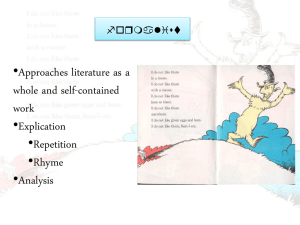Schools of Literary Theory Archetypal Criticism
advertisement

Schools of Literary Theory Archetypal Criticism This type of criticism examines the patterns that exist in literature. Archetypal critics believe that there is a universal quality to human life – humans recognize and often identify with the same types of characters, symbols, and situations. These conventions express the deepest human desires and fears – essentially mirroring the human condition. The universal characters, symbols, and situations that repeat in stories are called archetypes (damsel in distress, water, the quest) There are only really four types of stories – comedy, romance, tragedy, and irony/satire Feminist Criticism: This criticism studies the effect of gender of the process of reading or writing literature. Feminist critics say that the oppression of women is a historical fact and that literary texts mirror social attitudes about gender: Western civilization is patriarchal (ruled by the father). It is malecentered and controlled, and is organized to ensure women remain subordinate to men in all cultural domains. Gender – traits that are considered to be masculine (active, dominating, adventurous, rational) or feminine – by systematic oppression – (passive, acquiescent, timid, emotional, and conventional) is a social construct that was generated by the pervasive patriarchal biases of our civilization. Most highly regarded literary works focus on male protagonists who embody masculine traits and ways of feeling and pursue masculine interests in masculine fields of action. These works make the woman reader an alien outsider or else make her identify against herself by taking up the position of the male subject and therefore assume male values and ways of perceiving, feeling, and acting. Female characters are often marginal and subordinate, and are represented either as complementary to or in opposition to masculine desires and enterprises. Marxist Criticism: This criticism examines the social forces that shape people and culture. This school is especially concerned with issues of social and economic justice. Literature is essentially political because it either challenges or supports social or economic oppression. Karl Marx, founder of Marxism and Socialism, wrote the Communist Manifesto, which theorized about the reality of class struggles in the course of history. Marxist critics look at the power struggles between members of social classes. The lower class is exploited by the upper class, and it is very difficult to move up the social ladder. They are especially concerned with the manipulate ‘tricks’ used by those in positions of authority (religion, literature, data, propaganda, pop culture) “Power tends to corrupt, and absolute power corrupts absolutely” - John Dalberg Acton Psychoanalytical Criticism: This criticism believes that literature is influenced by the tradition of psychoanalysis started by Sigmund Freud. This criticism finds that all works of literature are an expression, in fictional form, of the state of mind and the structure of personality of the individual author. Literature consists of the imagined, or fantasized, fulfillment of wishes that are either denied by reality or are prohibited by the social standards of morality of propriety. Psychoanalysis examines the motivations and expressions of the unconscious mind. Authors are able to create stories that fulfill their sexual fantasies but these urges are distorted enough that their real motives are disguised from their conscious mind and to the average reader. Freudian critics like to point out the sexual implications of symbols and imagery. A psychoanalytical critic seeks to understand the true motives behind the behaviour of the characters in the story, or the author of the tale. Postcolonial Criticism: This criticism is interested in colonized countries (a country which is ruled by another – often more powerful- country) in their new situations, as they are often haunted by their colonized past. “Post” colonialism does refer to ‘after’ colonization temporally, but it examines the effects of imperial control over a colonized country and is in resistance to colonialism and imperialism. Colonization and imperialism involved forms of subjugation of the people by another (either through slavery, religious evangelism, or political control) Orientalism – the social construction of the “Other”; viewing someone from a colonized country as foreign and in opposition to the West – either as savage (dehumanized), romanticized, dangerous, supernatural, etc. Colonial discourse – language used to justify invasion, education, evangelization, or any other type of control (Kipling’s White Man’s Burden) Postcolonial discourse- identifies language that resists control, and speaks out against imperial action and injustice.
